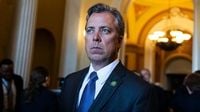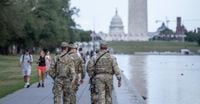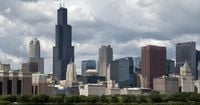On September 1, 2025, President Donald Trump declared Washington, DC, a "crime-free zone," just twelve days after placing the nation's capital under direct federal control. The announcement, made on Truth Social, was accompanied by a flurry of statistics: more than 700 arrests, the seizure of 91 illegal firearms, and a marked drop in major crimes, particularly gang-related and firearm violations, according to DefenceWeb. The operation saw approximately 800 National Guard troops and federal agents deployed to the city, signaling one of the most forceful federal interventions in recent American memory.
The move, emblematic of Trump's presidency, has reignited a fierce national debate over crime, public safety, and the limits of federal power. As highlighted in a detailed analysis published on September 1, 2025, by ET Explains, Trump's approach—swift, dramatic, and unapologetically heavy-handed—has put Democrats in a political bind. While the president's supporters cheer the crackdown, his critics warn of overreach and chaos. Yet, the numbers are hard to ignore, at least in the short term: arrests are up, guns are off the streets, and the president is touting a safer city.
But is the story really that simple? For many Americans, the answer is complicated. According to a recent Wall Street Journal poll, 51% of voters say Trump is bringing chaos and dysfunction to the country. Yet, at the same time, there is a widespread perception that crime is a real and growing threat. The nonpartisan National Survey on the American Criminal Justice System found that nearly three-quarters—73%—of Americans say crime has had "some" or a "major" impact on their daily lives. That’s a staggering number, and it helps explain why Trump’s law-and-order message resonates with so many, even if his tactics make others uneasy.
Democrats, meanwhile, are caught between a rock and a hard place. Opposing Trump’s federal crackdowns risks being painted as soft on crime, a label that polling shows is already a significant vulnerability for the party. According to both CNN and YouGov polls, Republicans are trusted over Democrats on crime by 13 and 12-point margins, respectively—the worst issue for Democrats in both surveys. This isn’t just a Beltway problem; it’s a national one. Even in deep-blue California, crime concerns have shifted the political landscape. In November, California voters passed Proposition 36 by a wide margin (68% to 32%), increasing sentences for certain offenses and signaling a clear appetite for tougher measures.
Two Democratic governors, Kathy Hochul of New York and JB Pritzker of Illinois, have tried to counter Trump’s narrative with their own numbers. They’ve issued statements packed with statistics, asserting that crime in their states is down or at least not at “emergency” levels that would justify deploying the National Guard. But, as the analysis in ET Explains notes, “no matter how many times these officials repeat the claims, voters simply do not feel safe.” The disconnect between official data and public perception is a persistent headache for Democrats, who risk repeating what some see as a critical mistake of former President Joe Biden: telling voters that something isn’t a problem when, in their lived experience, it plainly is.
The political risks are real for both sides. While Trump’s actions may satisfy voters who crave order, they also fuel concerns about federal overreach and the militarization of domestic policing. A separate Economist/YouGov survey found that a plurality of adults—48%—disapprove of deploying the National Guard and federalizing the city’s police force, including a majority (51%) of Independents. This suggests that while the crackdown may be popular in the short term, it could backfire if voters come to see it as an overreaction or as undermining local control.
The drama in Washington has echoes elsewhere. Earlier this summer, Trump sent National Guard soldiers, backed by U.S. Marines, to Los Angeles to combat crime, specifically assaults on immigration officials. The result? “Chaos in the streets,” as described by ET Explains. Now, with the White House warning that Chicago could be the next target for a federal crackdown and California Governor Gavin Newsom ramping up his own rhetorical fight with Trump, the stage is set for more confrontations. For Newsom, the stakes are especially high. As the governor of the nation’s second-largest metro area, he faces a delicate balancing act: oppose Trump too forcefully, and he risks being seen as defending criminals; go along with the crackdown, and he could alienate the progressive base he needs for a potential presidential run.
There’s historical precedent for this kind of political tightrope. When Republicans accused President Bill Clinton of being soft on crime nearly three decades ago, Clinton responded by calling for 100,000 more police officers to patrol American streets—a move that helped him recapture the narrative. But as the analysis points out, “it’s hard to imagine any Democrat doing that today, fearful that they would be criticized by the progressive wing.” Instead, Democrats seem stuck in a cycle of reflexively opposing Trump’s every move, regardless of the issue, and doubling down on policies that may not resonate with anxious voters.
Some political strategists suggest there’s a more palatable path forward for Democrats. They could acknowledge that crime is a genuine problem and offer moderate solutions—like bail reform or empowering district attorneys to increase sentences for a wider range of crimes—that might reassure voters without alienating the party’s base. But so far, few national figures have embraced this middle ground, leaving the field open for Trump to define the debate on his terms.
Meanwhile, Congressional Republicans are eager to press their advantage. According to Politico, the GOP is “giddy” at the prospect of forcing Democrats to vote on extending Trump’s police powers in Washington. Such a vote would put Democrats on the record and, as ET Explains notes, allow Republicans to “pummel Democrats on the campaign trail as soft on crime.” For now, Democrats show little sign of escaping this trap, even as polls and public sentiment suggest it’s an 80-20 issue—one where most voters side with tougher crime policies.
For everyday residents of Washington, Los Angeles, Chicago, and beyond, the debate is more than political theater. It’s about whether they feel safe in their neighborhoods, and whether their leaders are listening. The numbers from DC are striking, but the national conversation is far from settled. As the 2026 election cycle looms, both parties face tough choices about how to address crime, balance public safety with civil liberties, and convince voters that they have real solutions.
In the end, the story of Washington’s “crime-free zone” is about much more than one city or one president. It’s a snapshot of a nation wrestling with fear, trust, and the ever-shifting lines of political power.



